Hyundai
-
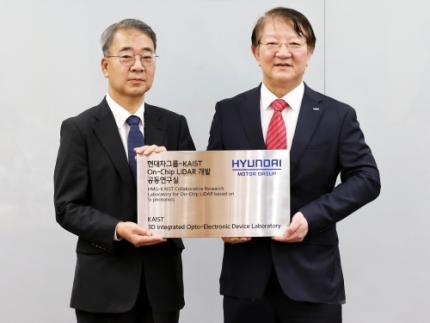 KAIST to begin Joint Research to Develop Next-Generation LiDAR System with Hyundai Motor Group
< (From left) Jong-Soo Lee, Executive Vice President at Hyundai Motor, Sang-Yup Lee, Senior Vice President for Research at KAIST >
The ‘Hyundai Motor Group-KAIST On-Chip LiDAR Joint Research Lab’ was opened at KAIST’s main campus in Daejeon to develop LiDAR sensors for advanced autonomous vehicles.
The joint research lab aims to develop high-performance and compact on-chip sensors and new signal detection technology, which are essential in the increasingly competitive autonomous driving market. On-chip sensors, which utilize semiconductor manufacturing technology to add various functions, can reduce the size of LiDAR systems compared to conventional methods and secure price competitiveness through mass production using semiconductor fabrication processes.
The joint research lab will consist of about 30 researchers, including the Hyundai-Kia Institute of Advanced Technology Development research team and KAIST professors Sanghyeon Kim, Sangsik Kim, Wanyeong Jung, and Hamza Kurt from KAIST’s School of Electrical Engineering, and will operate for four years until 2028.
KAIST will be leading the specialized work of each research team, such as for the development of silicon optoelectronic on-chip LiDAR components, the fabrication of high-speed, high-power integrated circuits to run the LiDAR systems, and the optimization and verification of LiDAR systems.
Hyundai Motor and Kia, together with Hyundai NGV, a specialized industry-academia cooperation institution, will oversee the operation of the joint research lab and provide support such as monitoring technological trends, suggesting research directions, deriving core ideas, and recommending technologies and experts to enhance research capabilities.
A Hyundai Motor Group official said, "We believe that this cooperation between Hyundai Motor Company and Kia, the leader in autonomous driving technology, and KAIST, the home of world-class technology, will hasten the achievement of fully autonomous driving." He added, "We will do our best to enable the lab to produce tangible results.”
Professor Sanghyeon Kim said, "The LiDAR sensor, which serves as the eyes of a car, is a core technology for future autonomous vehicle development that is essential for automobile companies to internalize."
2024.02.27 View 7327
KAIST to begin Joint Research to Develop Next-Generation LiDAR System with Hyundai Motor Group
< (From left) Jong-Soo Lee, Executive Vice President at Hyundai Motor, Sang-Yup Lee, Senior Vice President for Research at KAIST >
The ‘Hyundai Motor Group-KAIST On-Chip LiDAR Joint Research Lab’ was opened at KAIST’s main campus in Daejeon to develop LiDAR sensors for advanced autonomous vehicles.
The joint research lab aims to develop high-performance and compact on-chip sensors and new signal detection technology, which are essential in the increasingly competitive autonomous driving market. On-chip sensors, which utilize semiconductor manufacturing technology to add various functions, can reduce the size of LiDAR systems compared to conventional methods and secure price competitiveness through mass production using semiconductor fabrication processes.
The joint research lab will consist of about 30 researchers, including the Hyundai-Kia Institute of Advanced Technology Development research team and KAIST professors Sanghyeon Kim, Sangsik Kim, Wanyeong Jung, and Hamza Kurt from KAIST’s School of Electrical Engineering, and will operate for four years until 2028.
KAIST will be leading the specialized work of each research team, such as for the development of silicon optoelectronic on-chip LiDAR components, the fabrication of high-speed, high-power integrated circuits to run the LiDAR systems, and the optimization and verification of LiDAR systems.
Hyundai Motor and Kia, together with Hyundai NGV, a specialized industry-academia cooperation institution, will oversee the operation of the joint research lab and provide support such as monitoring technological trends, suggesting research directions, deriving core ideas, and recommending technologies and experts to enhance research capabilities.
A Hyundai Motor Group official said, "We believe that this cooperation between Hyundai Motor Company and Kia, the leader in autonomous driving technology, and KAIST, the home of world-class technology, will hasten the achievement of fully autonomous driving." He added, "We will do our best to enable the lab to produce tangible results.”
Professor Sanghyeon Kim said, "The LiDAR sensor, which serves as the eyes of a car, is a core technology for future autonomous vehicle development that is essential for automobile companies to internalize."
2024.02.27 View 7327 -
 KAIST Honors BMW and Hyundai with the 2022 Future Mobility of the Year Award
BMW ‘iVision Circular’, Commercial Vehicle-Hyundai Motors ‘Trailer Drone’ selected as winners of the international awards for concept cars established by KAIST Cho Chun Shik Graduate School of Mobility to honor car makers that strive to present new visions in the field of eco-friendly design of automobiles and unmanned logistics.
KAIST (President Kwang Hyung Lee) hosted the “2022 Future Mobility of the Year (FMOTY) Awards” at the Convention Hall of the BEXCO International Motor Show at Busan in the afternoon of the 14th.
The Future Mobility of the Year Awards is an award ceremony that selects a model that showcases useful transportation technology and innovative service concepts for the future society among the set of concept cars exhibited at the motor show.
As a one-of-a-kind international concept car awards established by KAIST's Cho Chun Shik Graduate School of Mobility (Headed by Professor Jang In-Gwon), the auto journalists from 11 countries were invited to be the jurors to select the winner. With the inaugural awards ceremony held in 2019, over the past three years, automakers from around the globe, including internationally renowned automakers, such as, Volvo/Toyota (2019), Honda/Hyundai (2020), and Renault (2021), even a new start-up car manufacturer like Canoo, the winner of last year’s award for commercial vehicles, were honored for their award-winning works.
At this year’s awards ceremony, the 4th of its kind, BMW's “iVision Circular” and Hyundai's “'Trailer Drone” were selected as the best concept cars of the year, the former from the Private Mobility category and the latter from the Public & Commercial Vehicles category.
The jury consisting of 16 domestic and foreign auto journalists, including BBC Top Gear's Paul Horrell and Car Magazine’s Georg Kacher, evaluated 53 concept car contestants that made their entry last year. The jurors’ general comment was that while the trend of the global automobile market flowing fast towards electric vehicles, this year's award-winning works presented a new vision in the field of eco-friendly design and unmanned logistics.
Private Mobility Categry Winner: BMW iVision Circular
BMW's 'iVision Circular', the winner of the Private Mobility category, is an eco-friendly compact car in which all parts of the vehicle are designed with recycled and/or natural materials. It has received favorable reviews for its in-depth implementation of the concept of a futuristic eco-friendly car by manufacturing the tires from natural rubber and adopting a design that made recycling of its parts very easily when the car is to be disposed of.
Public & Commercial Vehicles Categry Winner: Hyundai Trailer Drone
Hyundai Motor Company’s “Trailer Drone”, the winner of the Public & Commercial Vehicles category, is an eco-friendly autonomous driving truck that can transport large-scale logistics from a port to a destination without a human driver while two unmanned vehicles push and drag a trailer. The concept car won supports from a large number of judges for the blueprint it presented for a groundbreaking logistics service that applied both eco-friendly hydrogen fuel cell and fully autonomous driving technology.
Jurors from overseas congratulated the development team of BMW and Hyundai Motor Company via a video message for providing a new direction for the global automobile industry as it strives to transform in line with the changes in the post-pandemic era.
Professor Bo-won Kim, the Vice President for Planning and Budget of KAIST, who presented the awards, said, “It is time for the K-Mobility wave to sweep over the global mobility industry.” “KAIST will lead in the various fields of mobility technologies to support global automakers,” he added.
Splitting the center are KAIST Vice President Bo-Won Kim on the right, and Seong-Kwon Lee,
the Deputy Mayor of the City of Busan on the left. To Kim's left is the Senior VP of BMW Asia-Pacific, Eastern Europe, Middle East, Africa, Jean-Philippe Parain, and to Lee's Right is Sangyup Lee,
the Head of Hyundai Motor Design Center and the Executive VP of Hyundai Motors.
At the ceremony, along with KAIST officials, including Vice President Bo-Won Kim and Professor In-Gwon Jang, the Head of Cho Chun Shik Graduate School of Mobility, are the Deputy Mayor Seong-Kwon Lee of the City of Busan and the figures from the automobile industry, including Jean-Philippe Parain, the Senior Vice President of BMW Asia-Pacific, Eastern Europe, Middle East, Africa, who is visiting Korea to receive the '2022 Future Mobility' award, and Sangyup Lee, the Head of Hyundai Motor Design Center and the Executive Vice President of Hyundai Motor Company, were in the attendance.
More information about the awards ceremony and winning works are available at the official website of this year's Future Mobility Awards (www.fmoty.org).
Profile:In-Gwon Jang, Ph.D.Presidentthe Organizing Committeethe Future Mobility of the Year Awardshttp://www.fmoty.org/
Head ProfessorKAIST Cho Chun Shik Graduate School of Mobilityhttps://gt.kaist.ac.kr
2022.07.14 View 12748
KAIST Honors BMW and Hyundai with the 2022 Future Mobility of the Year Award
BMW ‘iVision Circular’, Commercial Vehicle-Hyundai Motors ‘Trailer Drone’ selected as winners of the international awards for concept cars established by KAIST Cho Chun Shik Graduate School of Mobility to honor car makers that strive to present new visions in the field of eco-friendly design of automobiles and unmanned logistics.
KAIST (President Kwang Hyung Lee) hosted the “2022 Future Mobility of the Year (FMOTY) Awards” at the Convention Hall of the BEXCO International Motor Show at Busan in the afternoon of the 14th.
The Future Mobility of the Year Awards is an award ceremony that selects a model that showcases useful transportation technology and innovative service concepts for the future society among the set of concept cars exhibited at the motor show.
As a one-of-a-kind international concept car awards established by KAIST's Cho Chun Shik Graduate School of Mobility (Headed by Professor Jang In-Gwon), the auto journalists from 11 countries were invited to be the jurors to select the winner. With the inaugural awards ceremony held in 2019, over the past three years, automakers from around the globe, including internationally renowned automakers, such as, Volvo/Toyota (2019), Honda/Hyundai (2020), and Renault (2021), even a new start-up car manufacturer like Canoo, the winner of last year’s award for commercial vehicles, were honored for their award-winning works.
At this year’s awards ceremony, the 4th of its kind, BMW's “iVision Circular” and Hyundai's “'Trailer Drone” were selected as the best concept cars of the year, the former from the Private Mobility category and the latter from the Public & Commercial Vehicles category.
The jury consisting of 16 domestic and foreign auto journalists, including BBC Top Gear's Paul Horrell and Car Magazine’s Georg Kacher, evaluated 53 concept car contestants that made their entry last year. The jurors’ general comment was that while the trend of the global automobile market flowing fast towards electric vehicles, this year's award-winning works presented a new vision in the field of eco-friendly design and unmanned logistics.
Private Mobility Categry Winner: BMW iVision Circular
BMW's 'iVision Circular', the winner of the Private Mobility category, is an eco-friendly compact car in which all parts of the vehicle are designed with recycled and/or natural materials. It has received favorable reviews for its in-depth implementation of the concept of a futuristic eco-friendly car by manufacturing the tires from natural rubber and adopting a design that made recycling of its parts very easily when the car is to be disposed of.
Public & Commercial Vehicles Categry Winner: Hyundai Trailer Drone
Hyundai Motor Company’s “Trailer Drone”, the winner of the Public & Commercial Vehicles category, is an eco-friendly autonomous driving truck that can transport large-scale logistics from a port to a destination without a human driver while two unmanned vehicles push and drag a trailer. The concept car won supports from a large number of judges for the blueprint it presented for a groundbreaking logistics service that applied both eco-friendly hydrogen fuel cell and fully autonomous driving technology.
Jurors from overseas congratulated the development team of BMW and Hyundai Motor Company via a video message for providing a new direction for the global automobile industry as it strives to transform in line with the changes in the post-pandemic era.
Professor Bo-won Kim, the Vice President for Planning and Budget of KAIST, who presented the awards, said, “It is time for the K-Mobility wave to sweep over the global mobility industry.” “KAIST will lead in the various fields of mobility technologies to support global automakers,” he added.
Splitting the center are KAIST Vice President Bo-Won Kim on the right, and Seong-Kwon Lee,
the Deputy Mayor of the City of Busan on the left. To Kim's left is the Senior VP of BMW Asia-Pacific, Eastern Europe, Middle East, Africa, Jean-Philippe Parain, and to Lee's Right is Sangyup Lee,
the Head of Hyundai Motor Design Center and the Executive VP of Hyundai Motors.
At the ceremony, along with KAIST officials, including Vice President Bo-Won Kim and Professor In-Gwon Jang, the Head of Cho Chun Shik Graduate School of Mobility, are the Deputy Mayor Seong-Kwon Lee of the City of Busan and the figures from the automobile industry, including Jean-Philippe Parain, the Senior Vice President of BMW Asia-Pacific, Eastern Europe, Middle East, Africa, who is visiting Korea to receive the '2022 Future Mobility' award, and Sangyup Lee, the Head of Hyundai Motor Design Center and the Executive Vice President of Hyundai Motor Company, were in the attendance.
More information about the awards ceremony and winning works are available at the official website of this year's Future Mobility Awards (www.fmoty.org).
Profile:In-Gwon Jang, Ph.D.Presidentthe Organizing Committeethe Future Mobility of the Year Awardshttp://www.fmoty.org/
Head ProfessorKAIST Cho Chun Shik Graduate School of Mobilityhttps://gt.kaist.ac.kr
2022.07.14 View 12748 -
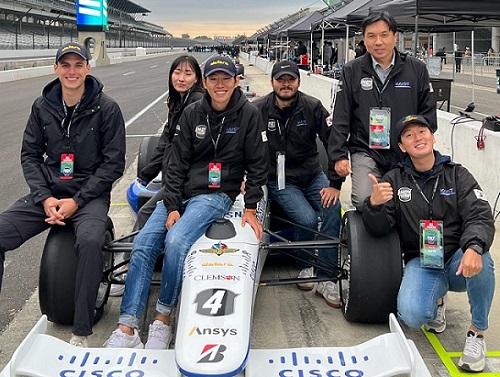 Team KAIST to Race at CES 2022 Autonomous Challenge
Five top university autonomous racing teams will compete in a head-to-head passing competition in Las Vegas
A self-driving racing team from the KAIST Unmanned System Research Group (USRG) advised by Professor Hyunchul Shim will compete at the Autonomous Challenge at the Consumer Electronic Show (CES) on January 7, 2022. The head-to-head, high speed autonomous racecar passing competition at the Las Vegas Motor Speedway will feature the finalists and semifinalists from the Indy Autonomous Challenge in October of this year. Team KAIST qualified as a semifinalist at the Indy Autonomous Challenge and will join four other university teams including the winner of the competition, Technische Universität München.
Team KAIST’s AV-21 vehicle is capable of driving on its own at more than 200km/h will be expected to show a speed of more than 300 km/h at the race.The participating teams are:1. KAIST2. EuroRacing : University of Modena and Reggio Emilia (Italy), University of Pisa (Italy), ETH Zürich (Switzerland), Polish Academy of Sciences (Poland) 3. MIT-PITT-RW, Massachusetts Institute of Technology, University of Pittsburgh, Rochester Institute of Technology, University of Waterloo (Canada)4.PoliMOVE – Politecnico di Milano (Italy), University of Alabama 5.TUM Autonomous Motorsport – Technische Universität München (Germany)
Professor Shim’s team is dedicated to the development and validation of cutting edge technologies for highly autonomous vehicles. In recognition of his pioneering research in unmanned system technologies, Professor Shim was honored with the Grand Prize of the Minister of Science and ICT on December 9.
“We began autonomous vehicle research in 2009 when we signed up for Hyundai Motor Company’s Autonomous Driving Challenge. For this, we developed a complete set of in-house technologies such as low-level vehicle control, perception, localization, and decision making.” In 2019, the team came in third place in the Challenge and they finally won this year.
For years, his team has participated in many unmanned systems challenges at home and abroad, gaining recognition around the world. The team won the inaugural 2016 IROS autonomous drone racing and placed second in the 2018 IROS Autonomous Drone Racing Competition. They also competed in 2017 MBZIRC, ranking fourth in Missions 2 and 3, and fifth in the Grand Challenge.
Most recently, the team won the first round of Lockheed Martin’s Alpha Pilot AI Drone Innovation Challenge. The team is now participating in the DARPA Subterranean Challenge as a member of Team CoSTAR with NASA JPL, MIT, and Caltech.
“We have accumulated plenty of first-hand experience developing autonomous vehicles with the support of domestic companies such as Hyundai Motor Company, Samsung, LG, and NAVER. In 2017, the autonomous vehicle platform “EureCar” that we developed in-house was authorized by the Korean government to lawfully conduct autonomous driving experiment on public roads,” said Professor Shim.
The team has developed various key technologies and algorithms related to unmanned systems that can be categorized into three major components: perception, planning, and control. Considering the characteristics of the algorithms that make up each module, their technology operates using a distributed computing system.
Since 2015, the team has been actively using deep learning algorithms in the form of perception subsystems. Contextual information extracted from multi-modal sensory data gathered via cameras, lidar, radar, GPS, IMU, etc. is forwarded to the planning subsystem. The planning module is responsible for the decision making and planning required for autonomous driving such as lane change determination and trajectory planning, emergency stops, and velocity command generation. The results from the planner are fed into the controller to follow the planned high-level command. The team has also developed and verified the possibility of an end-to-end deep learning based autonomous driving approach that replaces a complex system with one single AI network.
2021.12.17 View 10240
Team KAIST to Race at CES 2022 Autonomous Challenge
Five top university autonomous racing teams will compete in a head-to-head passing competition in Las Vegas
A self-driving racing team from the KAIST Unmanned System Research Group (USRG) advised by Professor Hyunchul Shim will compete at the Autonomous Challenge at the Consumer Electronic Show (CES) on January 7, 2022. The head-to-head, high speed autonomous racecar passing competition at the Las Vegas Motor Speedway will feature the finalists and semifinalists from the Indy Autonomous Challenge in October of this year. Team KAIST qualified as a semifinalist at the Indy Autonomous Challenge and will join four other university teams including the winner of the competition, Technische Universität München.
Team KAIST’s AV-21 vehicle is capable of driving on its own at more than 200km/h will be expected to show a speed of more than 300 km/h at the race.The participating teams are:1. KAIST2. EuroRacing : University of Modena and Reggio Emilia (Italy), University of Pisa (Italy), ETH Zürich (Switzerland), Polish Academy of Sciences (Poland) 3. MIT-PITT-RW, Massachusetts Institute of Technology, University of Pittsburgh, Rochester Institute of Technology, University of Waterloo (Canada)4.PoliMOVE – Politecnico di Milano (Italy), University of Alabama 5.TUM Autonomous Motorsport – Technische Universität München (Germany)
Professor Shim’s team is dedicated to the development and validation of cutting edge technologies for highly autonomous vehicles. In recognition of his pioneering research in unmanned system technologies, Professor Shim was honored with the Grand Prize of the Minister of Science and ICT on December 9.
“We began autonomous vehicle research in 2009 when we signed up for Hyundai Motor Company’s Autonomous Driving Challenge. For this, we developed a complete set of in-house technologies such as low-level vehicle control, perception, localization, and decision making.” In 2019, the team came in third place in the Challenge and they finally won this year.
For years, his team has participated in many unmanned systems challenges at home and abroad, gaining recognition around the world. The team won the inaugural 2016 IROS autonomous drone racing and placed second in the 2018 IROS Autonomous Drone Racing Competition. They also competed in 2017 MBZIRC, ranking fourth in Missions 2 and 3, and fifth in the Grand Challenge.
Most recently, the team won the first round of Lockheed Martin’s Alpha Pilot AI Drone Innovation Challenge. The team is now participating in the DARPA Subterranean Challenge as a member of Team CoSTAR with NASA JPL, MIT, and Caltech.
“We have accumulated plenty of first-hand experience developing autonomous vehicles with the support of domestic companies such as Hyundai Motor Company, Samsung, LG, and NAVER. In 2017, the autonomous vehicle platform “EureCar” that we developed in-house was authorized by the Korean government to lawfully conduct autonomous driving experiment on public roads,” said Professor Shim.
The team has developed various key technologies and algorithms related to unmanned systems that can be categorized into three major components: perception, planning, and control. Considering the characteristics of the algorithms that make up each module, their technology operates using a distributed computing system.
Since 2015, the team has been actively using deep learning algorithms in the form of perception subsystems. Contextual information extracted from multi-modal sensory data gathered via cameras, lidar, radar, GPS, IMU, etc. is forwarded to the planning subsystem. The planning module is responsible for the decision making and planning required for autonomous driving such as lane change determination and trajectory planning, emergency stops, and velocity command generation. The results from the planner are fed into the controller to follow the planned high-level command. The team has also developed and verified the possibility of an end-to-end deep learning based autonomous driving approach that replaces a complex system with one single AI network.
2021.12.17 View 10240 -
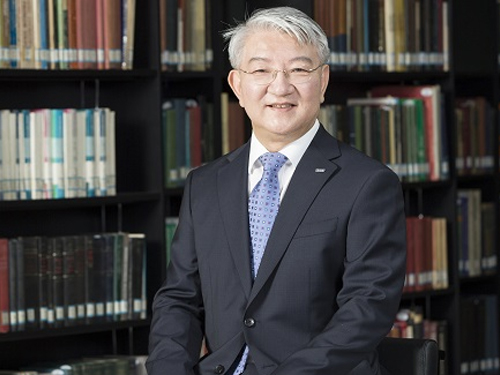 VP Sang Yup Lee Honored with the Pony Chung Innovation Award
Vice President for Research Sang Yup Lee became the recipient of the Innovation Award by the Pony Chung Foundation that was established to honor the late Se-yung Chung, the former chairman of Hyundai Development Company. He will receive 200 million KRW in prize money. Chairman Chung developed Korea’s first domestically manufactured automobile, ‘Pony,’ in the mid-1970s that became the cornerstone of Korea’s auto industry today.
Distinguished Professor Lee, from the Department of Chemical and Biomolecular Engineering, is a pioneering scholar in the field of systems metabolic engineering who developed various micro-organisms for producing a wide range of fuels, chemicals, materials, and natural compounds.
He recently was elected as a foreign member of the Royal Society in the UK and is the first Korean ever elected into the National Academy of Inventors (NAI) in the US as well as one of 13 scholars elected as an International Member of both the National Academy of Sciences (NAS) and the National Academy of Engineering (NAE) in the US.
2021.07.13 View 9507
VP Sang Yup Lee Honored with the Pony Chung Innovation Award
Vice President for Research Sang Yup Lee became the recipient of the Innovation Award by the Pony Chung Foundation that was established to honor the late Se-yung Chung, the former chairman of Hyundai Development Company. He will receive 200 million KRW in prize money. Chairman Chung developed Korea’s first domestically manufactured automobile, ‘Pony,’ in the mid-1970s that became the cornerstone of Korea’s auto industry today.
Distinguished Professor Lee, from the Department of Chemical and Biomolecular Engineering, is a pioneering scholar in the field of systems metabolic engineering who developed various micro-organisms for producing a wide range of fuels, chemicals, materials, and natural compounds.
He recently was elected as a foreign member of the Royal Society in the UK and is the first Korean ever elected into the National Academy of Inventors (NAI) in the US as well as one of 13 scholars elected as an International Member of both the National Academy of Sciences (NAS) and the National Academy of Engineering (NAE) in the US.
2021.07.13 View 9507 -
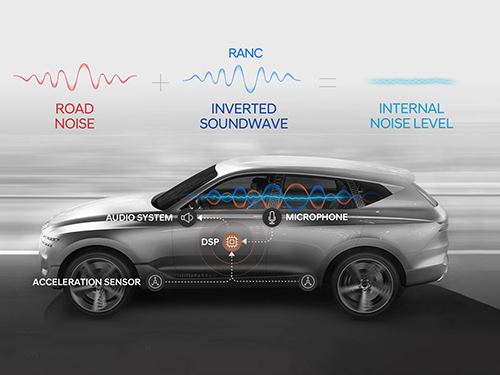 A System Controlling Road Active Noise to Hit the Road
The research team led by Professor Youngjin Park of the Department of Mechanical Engineering has developed a road noise active noise control (RANC) system to be commercialized in partnership with Hyundai Motor Group.
On December 11, Hyundai Motor Group announced the successful development of the RANC system, which significantly reduces the road noise flowing into cars. The carmaker has completed the domestic and American patent applications for the location of sensors and the signal selection method, the core technology of RANC.
RANC is a technology for reducing road noise during driving. This system consists of an acceleration sensor, digital signal processor (the control computer to analyze sound signals), microphone, amplifier, and audio system. To make the system as simple as possible, the audio system utilizes the original audio system embedded in the car instead of a separate system.
The acceleration sensor first calculates the vibration from the road into the car. The location of the sensor is important for accurately identifying the vibration path. The research team was able to find the optimal sensor location through a number of tests.
The System Dynamics and Applied Control Laboratory of Professor Park researched ways to significantly reduce road noise with Hyundai Motor Group for four years from 1993 as a G7 national project and published the results in international journals. In 2002, the researchers published an article titled “Noise Quietens Driving” in Nature, where they announced the first success in reducing road noise in actual cars. The achievement did not lead to commercialization, however, due to the lack of auxiliary technologies at the time, digital amplifiers and DSP for cars for example, and pricing issues.
Since 2013, Professor Park’s research team has participated in one technology transfer and eight university-industry projects. Based on these efforts, the team was able to successfully develop the RANC system with domestic technology in partnership with Hyundai’s NVH Research Lab (Research Fellow, Dr. Gangdeok Lee; Ph.D. in aviation engineering, 1996), Optomech (Founder, Professor Gyeongsu Kim; Ph.D. in mechanical engineering, 1999), ARE (CEO Hyeonseok Kim; Ph.D. in mechanical engineering, 1998), WeAcom, and BurnYoung.
Professor Park’s team led the project by performing theory-based research during the commercialization stage in collaboration with Hyundai Motor Group.
For the commercialization of the RANC system, Hyundai Motor Group is planning to collaborate with the global car audio company Harman to increase the degree of completion and apply the RANC system to the GV 80, the first SUV model of the Genesis brand.
“I am very delighted as an engineer to see the research I worked on from my early days at KAIST be commercialized after 20 years,” noted Professor Park. “I am thrilled to make a contribution to such commercialization with my students in my lab.”
2019.12.27 View 11332
A System Controlling Road Active Noise to Hit the Road
The research team led by Professor Youngjin Park of the Department of Mechanical Engineering has developed a road noise active noise control (RANC) system to be commercialized in partnership with Hyundai Motor Group.
On December 11, Hyundai Motor Group announced the successful development of the RANC system, which significantly reduces the road noise flowing into cars. The carmaker has completed the domestic and American patent applications for the location of sensors and the signal selection method, the core technology of RANC.
RANC is a technology for reducing road noise during driving. This system consists of an acceleration sensor, digital signal processor (the control computer to analyze sound signals), microphone, amplifier, and audio system. To make the system as simple as possible, the audio system utilizes the original audio system embedded in the car instead of a separate system.
The acceleration sensor first calculates the vibration from the road into the car. The location of the sensor is important for accurately identifying the vibration path. The research team was able to find the optimal sensor location through a number of tests.
The System Dynamics and Applied Control Laboratory of Professor Park researched ways to significantly reduce road noise with Hyundai Motor Group for four years from 1993 as a G7 national project and published the results in international journals. In 2002, the researchers published an article titled “Noise Quietens Driving” in Nature, where they announced the first success in reducing road noise in actual cars. The achievement did not lead to commercialization, however, due to the lack of auxiliary technologies at the time, digital amplifiers and DSP for cars for example, and pricing issues.
Since 2013, Professor Park’s research team has participated in one technology transfer and eight university-industry projects. Based on these efforts, the team was able to successfully develop the RANC system with domestic technology in partnership with Hyundai’s NVH Research Lab (Research Fellow, Dr. Gangdeok Lee; Ph.D. in aviation engineering, 1996), Optomech (Founder, Professor Gyeongsu Kim; Ph.D. in mechanical engineering, 1999), ARE (CEO Hyeonseok Kim; Ph.D. in mechanical engineering, 1998), WeAcom, and BurnYoung.
Professor Park’s team led the project by performing theory-based research during the commercialization stage in collaboration with Hyundai Motor Group.
For the commercialization of the RANC system, Hyundai Motor Group is planning to collaborate with the global car audio company Harman to increase the degree of completion and apply the RANC system to the GV 80, the first SUV model of the Genesis brand.
“I am very delighted as an engineer to see the research I worked on from my early days at KAIST be commercialized after 20 years,” noted Professor Park. “I am thrilled to make a contribution to such commercialization with my students in my lab.”
2019.12.27 View 11332 -
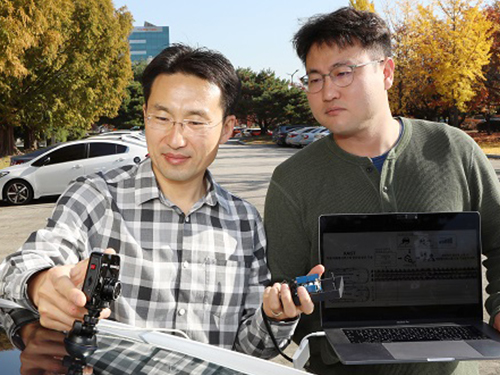 AI to Determine When to Intervene with Your Driving
(Professor Uichin Lee (left) and PhD candidate Auk Kim)
Can your AI agent judge when to talk to you while you are driving? According to a KAIST research team, their in-vehicle conservation service technology will judge when it is appropriate to contact you to ensure your safety.
Professor Uichin Lee from the Department of Industrial and Systems Engineering at KAIST and his research team have developed AI technology that automatically detects safe moments for AI agents to provide conversation services to drivers.
Their research focuses on solving the potential problems of distraction created by in-vehicle conversation services. If an AI agent talks to a driver at an inopportune moment, such as while making a turn, a car accident will be more likely to occur.
In-vehicle conversation services need to be convenient as well as safe. However, the cognitive burden of multitasking negatively influences the quality of the service. Users tend to be more distracted during certain traffic conditions. To address this long-standing challenge of the in-vehicle conversation services, the team introduced a composite cognitive model that considers both safe driving and auditory-verbal service performance and used a machine-learning model for all collected data.
The combination of these individual measures is able to determine the appropriate moments for conversation and most appropriate types of conversational services. For instance, in the case of delivering simple-context information, such as a weather forecast, driver safety alone would be the most appropriate consideration. Meanwhile, when delivering information that requires a driver response, such as a “Yes” or “No,” the combination of driver safety and auditory-verbal performance should be considered.
The research team developed a prototype of an in-vehicle conversation service based on a navigation app that can be used in real driving environments. The app was also connected to the vehicle to collect in-vehicle OBD-II/CAN data, such as the steering wheel angle and brake pedal position, and mobility and environmental data such as the distance between successive cars and traffic flow.
Using pseudo-conversation services, the research team collected a real-world driving dataset consisting of 1,388 interactions and sensor data from 29 drivers who interacted with AI conversational agents. Machine learning analysis based on the dataset demonstrated that the opportune moments for driver interruption could be correctly inferred with 87% accuracy.
The safety enhancement technology developed by the team is expected to minimize driver distractions caused by in-vehicle conversation services. This technology can be directly applied to current in-vehicle systems that provide conversation services. It can also be extended and applied to the real-time detection of driver distraction problems caused by the use of a smartphone while driving.
Professor Lee said, “In the near future, cars will proactively deliver various in-vehicle conversation services. This technology will certainly help vehicles interact with their drivers safely as it can fairly accurately determine when to provide conversation services using only basic sensor data generated by cars.”
The researchers presented their findings at the ACM International Joint Conference on Pervasive and Ubiquitous Computing (Ubicomp’19) in London, UK. This research was supported in part by Hyundai NGV and by the Next-Generation Information Computing Development Program through the National Research Foundation of Korea (NRF) funded by the Ministry of Science and ICT.
(Figure: Visual description of safe enhancement technology for in-vehicle conversation services)
2019.11.13 View 16822
AI to Determine When to Intervene with Your Driving
(Professor Uichin Lee (left) and PhD candidate Auk Kim)
Can your AI agent judge when to talk to you while you are driving? According to a KAIST research team, their in-vehicle conservation service technology will judge when it is appropriate to contact you to ensure your safety.
Professor Uichin Lee from the Department of Industrial and Systems Engineering at KAIST and his research team have developed AI technology that automatically detects safe moments for AI agents to provide conversation services to drivers.
Their research focuses on solving the potential problems of distraction created by in-vehicle conversation services. If an AI agent talks to a driver at an inopportune moment, such as while making a turn, a car accident will be more likely to occur.
In-vehicle conversation services need to be convenient as well as safe. However, the cognitive burden of multitasking negatively influences the quality of the service. Users tend to be more distracted during certain traffic conditions. To address this long-standing challenge of the in-vehicle conversation services, the team introduced a composite cognitive model that considers both safe driving and auditory-verbal service performance and used a machine-learning model for all collected data.
The combination of these individual measures is able to determine the appropriate moments for conversation and most appropriate types of conversational services. For instance, in the case of delivering simple-context information, such as a weather forecast, driver safety alone would be the most appropriate consideration. Meanwhile, when delivering information that requires a driver response, such as a “Yes” or “No,” the combination of driver safety and auditory-verbal performance should be considered.
The research team developed a prototype of an in-vehicle conversation service based on a navigation app that can be used in real driving environments. The app was also connected to the vehicle to collect in-vehicle OBD-II/CAN data, such as the steering wheel angle and brake pedal position, and mobility and environmental data such as the distance between successive cars and traffic flow.
Using pseudo-conversation services, the research team collected a real-world driving dataset consisting of 1,388 interactions and sensor data from 29 drivers who interacted with AI conversational agents. Machine learning analysis based on the dataset demonstrated that the opportune moments for driver interruption could be correctly inferred with 87% accuracy.
The safety enhancement technology developed by the team is expected to minimize driver distractions caused by in-vehicle conversation services. This technology can be directly applied to current in-vehicle systems that provide conversation services. It can also be extended and applied to the real-time detection of driver distraction problems caused by the use of a smartphone while driving.
Professor Lee said, “In the near future, cars will proactively deliver various in-vehicle conversation services. This technology will certainly help vehicles interact with their drivers safely as it can fairly accurately determine when to provide conversation services using only basic sensor data generated by cars.”
The researchers presented their findings at the ACM International Joint Conference on Pervasive and Ubiquitous Computing (Ubicomp’19) in London, UK. This research was supported in part by Hyundai NGV and by the Next-Generation Information Computing Development Program through the National Research Foundation of Korea (NRF) funded by the Ministry of Science and ICT.
(Figure: Visual description of safe enhancement technology for in-vehicle conversation services)
2019.11.13 View 16822 -
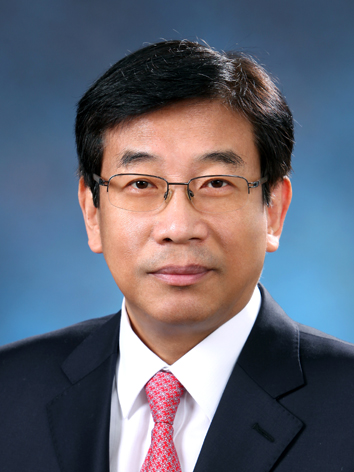 Professor Jae-Kyu Lee Elected to Head the Association for Information Systems
Jae Kyu Lee, HHI (Hyundai Heavy Industries, Co., Ltd.) Chair Professor, College of Business at KAIST, was elected to lead the world major academic society, Association for Information Systems (AIS), from July 2015 to June 2016. Professor Lee will be the first Korean to serve the organization as president. From July 2014 to June 2015, he will serve as president-elect.
Currently, Professor Lee is the Director of EEWS (Energy, Environment, Water, and Sustainability) Research Center at KAIST, focusing on research and development in finding solutions to critical issues facing humanity. He also played a pivotal role in the conclusion of a memorandum of understanding between HHI and KAIST in June 2013 to establish HHI-KAIST EEWS Research Center within the KAIST campus.
The AIS is the premier professional association for individuals and organizations who lead the research, teaching, practice, and study of information systems worldwide.
A news article on his appointment:
Asian Scientist, May 16, 2014
Korean Engineer To Lead The Association For Information Systems
http://www.asianscientist.com/academia/korean-engineer-lead-association-information-systems-2014/
2014.05.19 View 11185
Professor Jae-Kyu Lee Elected to Head the Association for Information Systems
Jae Kyu Lee, HHI (Hyundai Heavy Industries, Co., Ltd.) Chair Professor, College of Business at KAIST, was elected to lead the world major academic society, Association for Information Systems (AIS), from July 2015 to June 2016. Professor Lee will be the first Korean to serve the organization as president. From July 2014 to June 2015, he will serve as president-elect.
Currently, Professor Lee is the Director of EEWS (Energy, Environment, Water, and Sustainability) Research Center at KAIST, focusing on research and development in finding solutions to critical issues facing humanity. He also played a pivotal role in the conclusion of a memorandum of understanding between HHI and KAIST in June 2013 to establish HHI-KAIST EEWS Research Center within the KAIST campus.
The AIS is the premier professional association for individuals and organizations who lead the research, teaching, practice, and study of information systems worldwide.
A news article on his appointment:
Asian Scientist, May 16, 2014
Korean Engineer To Lead The Association For Information Systems
http://www.asianscientist.com/academia/korean-engineer-lead-association-information-systems-2014/
2014.05.19 View 11185 -
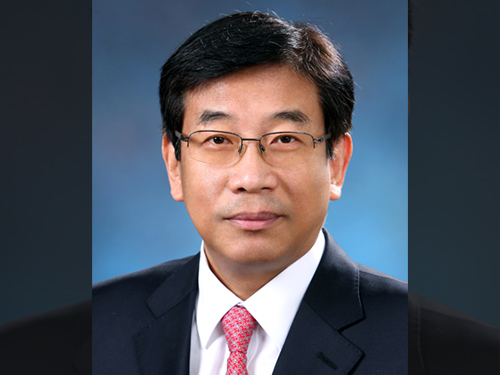 Professor Jae-Kyu Lee Elected to Head the Association for Information Systems
Jae Kyu Lee, HHI (Hyundai Heavy Industries, Co., Ltd.) Chair Professor, College of Business at KAIST, has been elected to lead the world major academic society, Association for Information Systems (AIS), from July 2015 to June 2016. Professor Lee will be the first Korean to serve the organization as president. From July 2014 to June 2015, he will serve as president-elect.
Currently, Professor Lee is the Director of EEWS (Energy, Environment, Water, and Sustainability) Research Center at KAIST, focusing on research and development in finding solutions to critical issues facing humanity. He also played a pivotal role in the conclusion of a memorandum of understanding between HHI and KAIST in June 2013 to establish HHI-KAIST EEWS Research Center within the KAIST campus.
The AIS is the premier professional association for individuals and organizations who lead the research, teaching, practice, and study of information systems worldwide.
2014.05.14 View 10266
Professor Jae-Kyu Lee Elected to Head the Association for Information Systems
Jae Kyu Lee, HHI (Hyundai Heavy Industries, Co., Ltd.) Chair Professor, College of Business at KAIST, has been elected to lead the world major academic society, Association for Information Systems (AIS), from July 2015 to June 2016. Professor Lee will be the first Korean to serve the organization as president. From July 2014 to June 2015, he will serve as president-elect.
Currently, Professor Lee is the Director of EEWS (Energy, Environment, Water, and Sustainability) Research Center at KAIST, focusing on research and development in finding solutions to critical issues facing humanity. He also played a pivotal role in the conclusion of a memorandum of understanding between HHI and KAIST in June 2013 to establish HHI-KAIST EEWS Research Center within the KAIST campus.
The AIS is the premier professional association for individuals and organizations who lead the research, teaching, practice, and study of information systems worldwide.
2014.05.14 View 10266 -
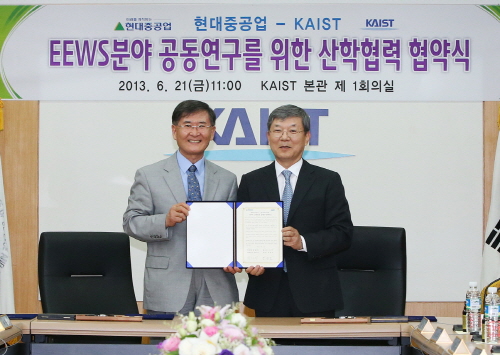 Joint Research Center on EEWS with Hyundai Heavy Industries Plans to Open
The research center will conduct collaborative R&D projects on energy, environment, water, and sustainability for the next five years.Hyundai Heavy Industries (HHI), the world’s largest shipbuilding company, signed an MOU with KAIST for future business development and joint research collaboration.
KAIST and HHI signed an MOU as an agreement to establish the “HHI-KAIST EEWS Research Center (HK Research Center) on June 21st.”
The major mission of the HK Research Center is to build a strong base for creating future businesses through developing fundamental, core technology in the field of EEWS and designing business models based on the new technology.
Toward this goal, HHI will sponsor the R&D budget and operation expenses of the research center for the next five years.
Prior to the signing of the MOU, a delegation from HHI, led by the Vice President, Mr. Si-Young Hwang, visited the Office of EEWS Initiative at KAIST and held a workshop. During the workshop, HHI and KAIST agreed to collaborate in fields such as LNG-propelled ships, solar power generation, energy storage, fuel cells, and CO2 capture.
KAIST has run a EEWS graduate program that receives government grants over the last five years, with a research emphasis on energy, environment, water, and sustainability, which are crucial issues to humankind in the 21st century. The EEWS program achieved 24 core technological developments and educates more than 200 masters- and PhD-degree students annually.
The EEWS program also emphasizes commercializing its research outcomes. Through the annual Business Planning Competition and Investment Drive, there have been eight new companies founded by alumni and professors over the last five years of the program. The HK Research Center will be an excellent foundation for future education and research in EEWS.
Professor Jae-Kyu Lee, the head of the HK Research Center and the director of the EEWS Initiative, said, “This event is a benchmarking example of Industry-KAIST collaboration. We hope that the HK Research Center will be a place for disruptive innovations to translate into creative business opportunities.”
MOU signed for Hyundai Heavy Industries-KAIST EEWS Research Center
2013.07.15 View 8820
Joint Research Center on EEWS with Hyundai Heavy Industries Plans to Open
The research center will conduct collaborative R&D projects on energy, environment, water, and sustainability for the next five years.Hyundai Heavy Industries (HHI), the world’s largest shipbuilding company, signed an MOU with KAIST for future business development and joint research collaboration.
KAIST and HHI signed an MOU as an agreement to establish the “HHI-KAIST EEWS Research Center (HK Research Center) on June 21st.”
The major mission of the HK Research Center is to build a strong base for creating future businesses through developing fundamental, core technology in the field of EEWS and designing business models based on the new technology.
Toward this goal, HHI will sponsor the R&D budget and operation expenses of the research center for the next five years.
Prior to the signing of the MOU, a delegation from HHI, led by the Vice President, Mr. Si-Young Hwang, visited the Office of EEWS Initiative at KAIST and held a workshop. During the workshop, HHI and KAIST agreed to collaborate in fields such as LNG-propelled ships, solar power generation, energy storage, fuel cells, and CO2 capture.
KAIST has run a EEWS graduate program that receives government grants over the last five years, with a research emphasis on energy, environment, water, and sustainability, which are crucial issues to humankind in the 21st century. The EEWS program achieved 24 core technological developments and educates more than 200 masters- and PhD-degree students annually.
The EEWS program also emphasizes commercializing its research outcomes. Through the annual Business Planning Competition and Investment Drive, there have been eight new companies founded by alumni and professors over the last five years of the program. The HK Research Center will be an excellent foundation for future education and research in EEWS.
Professor Jae-Kyu Lee, the head of the HK Research Center and the director of the EEWS Initiative, said, “This event is a benchmarking example of Industry-KAIST collaboration. We hope that the HK Research Center will be a place for disruptive innovations to translate into creative business opportunities.”
MOU signed for Hyundai Heavy Industries-KAIST EEWS Research Center
2013.07.15 View 8820 -
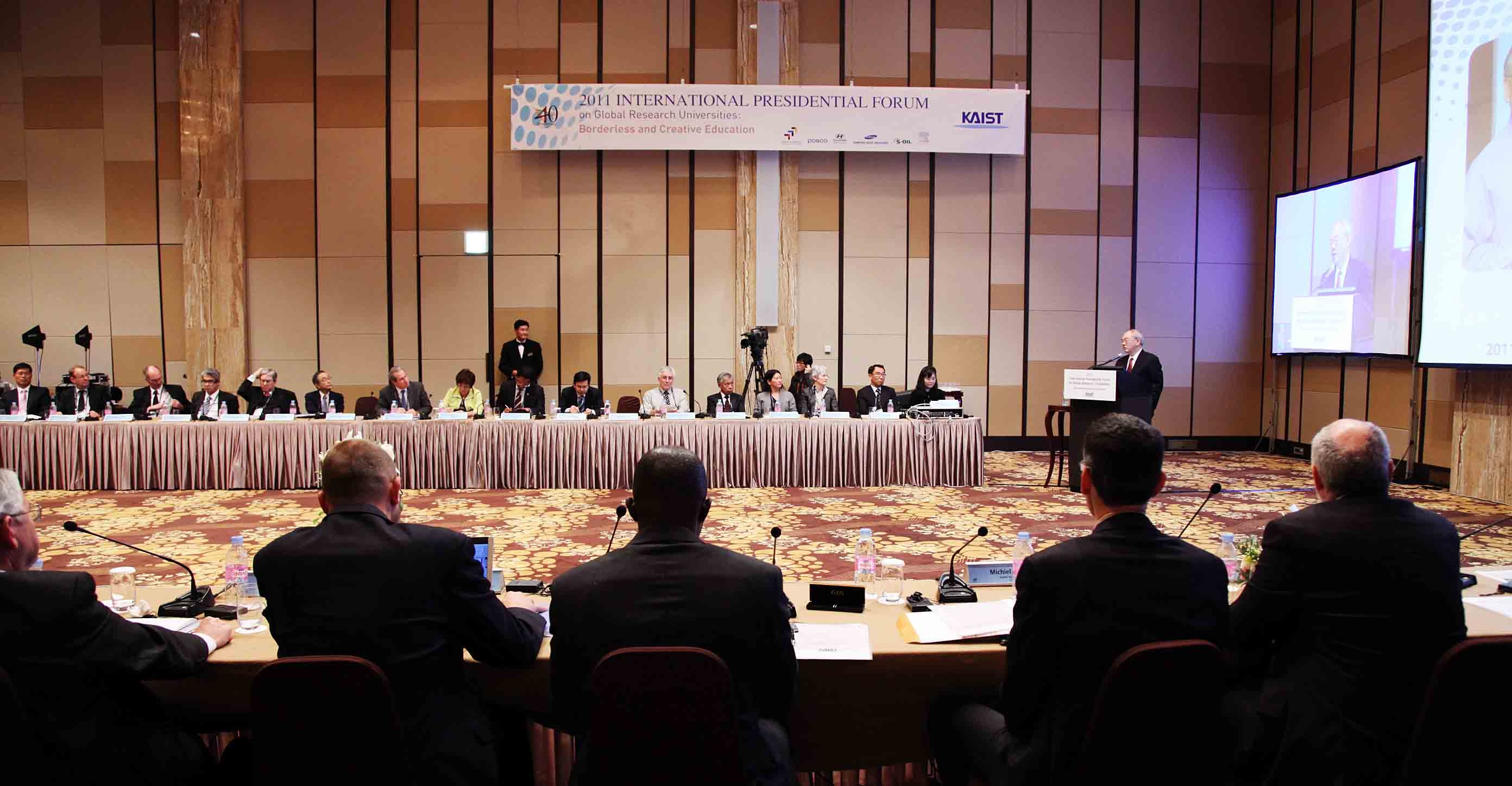 2011 International Presidential Forum on Global Research Universities
KAIST’s 4th International Presidential Forum Held in Seoul on November 8, 2011
The largest annual congregation of university presidents in Asia invited leaders from academia, government, and industry for talks on issues related to higher education in the Age of Globalization.
Borderless and Creative Education: the ability to cross borders a crucial key to dominate the information era
Seoul, Republic of Korea, November 8, 2011—The Korea Advanced Institute of Science and Technology (KAIST) hosted the “2011 International Presidential Forum on Global Research Universities (IPFGRU)” on Tuesday, November 8, 2011 at the Millennium Hilton Hotel in Seoul.
With more than 120 participants from 44 institutions in 27 countries present, the full-day forum provided participants with an opportunity to discuss challenges and responsibilities facing higher education in a time of globalization that has resulted from an ever-growing demand for technological innovation.
In his plenary speech, Dr. Robert Birgeneau, Chancellor of UC Berkeley, stressed that “Higher educational intuitions must be prepared to drive innovation and enhance competitiveness by educating a highly trained workforce that will have the critical skills necessary to solve problems and lead in today’s interdependent world.”
“Finding solutions to the world’s most challenging problems will depend on the ability to cross borders: national borders, border between different fields of discipline and research, and borders between academe, government, and industry,” said Chancellor Birgeneau to address the importance of “borderless and creative education,” the theme of the forum.
Other major keynote speakers were Jörg Steinbach, President of Technische Universität Berlin, Lars Pallesen, President of Technical University of Denmark, Paul F. Greenfield, President of University of Queensland, Marcelo Fernandes de Aquino, President of the University of the Sinos Valley (UNISINOS), and Eden Woon, Vice President of the Hong Kong University of Science and Technology.
Dr. Nam-Pyo Suh, President of KAIST, gave talks on the university’s new education plan, “The I-Four Education,” at the afternoon session. The four Is are information technology (IT), independent learning, integrated knowledge acquisitions, and an international learning environment.
“In this format, there are no formal lectures,” President Suh explained. “A group of students learn together by using the materials available on the internet, doing homework and conducting experiments together. Pre-recorded lectures are delivered in English by I-Four professors, some of them regular KAIST professors and some professors in other countries who participate in the I-Four Program as consulting professors.”
He added, “The overall purpose of the I-Four Education Program is to encourage students to learn independently, gain exposure to the best lectures by the most eminent professors in the world, accelerate the development of a global frame of reference in the students by dealing with information available throughout the world, and provide an integrated learning environment by using diverse examples from many disciplines to achieve understanding of basic principles.”
The 2011 IPFGRU, the fourth forum since its inception in 2008, rose to prominence in the past years as an international network for leaders of research universities from around the world to share information and exchange views about contemporary issues in higher education.
At this year’s forum, entitled “Borderless and Creative Education,” speakers took a deeper look into the transitions and transformations many research universities are undergoing today, delving into the following topics: the development of e-learning and cyber campuses; increased student mobility and international collaborations; multi-disciplinary and convergence approaches in research and education; and methodology of nurturing future global leaders.
Participants also discussed experiences and accomplishments earned from their own endeavors to accommodate such changes and presented ways to strengthen internationalization and improve the academic and research competitiveness of universities.
The 2011 International Presidential Forum on Global Research Universities (IPFGRU) was organized by KAIST and sponsored by the Ministry of Education, Science and Technology, POSCO, Hyundai Motor Company, Samsung Heavy Industries, S-Oil, and Elsevier Korea.
2011.11.09 View 13392
2011 International Presidential Forum on Global Research Universities
KAIST’s 4th International Presidential Forum Held in Seoul on November 8, 2011
The largest annual congregation of university presidents in Asia invited leaders from academia, government, and industry for talks on issues related to higher education in the Age of Globalization.
Borderless and Creative Education: the ability to cross borders a crucial key to dominate the information era
Seoul, Republic of Korea, November 8, 2011—The Korea Advanced Institute of Science and Technology (KAIST) hosted the “2011 International Presidential Forum on Global Research Universities (IPFGRU)” on Tuesday, November 8, 2011 at the Millennium Hilton Hotel in Seoul.
With more than 120 participants from 44 institutions in 27 countries present, the full-day forum provided participants with an opportunity to discuss challenges and responsibilities facing higher education in a time of globalization that has resulted from an ever-growing demand for technological innovation.
In his plenary speech, Dr. Robert Birgeneau, Chancellor of UC Berkeley, stressed that “Higher educational intuitions must be prepared to drive innovation and enhance competitiveness by educating a highly trained workforce that will have the critical skills necessary to solve problems and lead in today’s interdependent world.”
“Finding solutions to the world’s most challenging problems will depend on the ability to cross borders: national borders, border between different fields of discipline and research, and borders between academe, government, and industry,” said Chancellor Birgeneau to address the importance of “borderless and creative education,” the theme of the forum.
Other major keynote speakers were Jörg Steinbach, President of Technische Universität Berlin, Lars Pallesen, President of Technical University of Denmark, Paul F. Greenfield, President of University of Queensland, Marcelo Fernandes de Aquino, President of the University of the Sinos Valley (UNISINOS), and Eden Woon, Vice President of the Hong Kong University of Science and Technology.
Dr. Nam-Pyo Suh, President of KAIST, gave talks on the university’s new education plan, “The I-Four Education,” at the afternoon session. The four Is are information technology (IT), independent learning, integrated knowledge acquisitions, and an international learning environment.
“In this format, there are no formal lectures,” President Suh explained. “A group of students learn together by using the materials available on the internet, doing homework and conducting experiments together. Pre-recorded lectures are delivered in English by I-Four professors, some of them regular KAIST professors and some professors in other countries who participate in the I-Four Program as consulting professors.”
He added, “The overall purpose of the I-Four Education Program is to encourage students to learn independently, gain exposure to the best lectures by the most eminent professors in the world, accelerate the development of a global frame of reference in the students by dealing with information available throughout the world, and provide an integrated learning environment by using diverse examples from many disciplines to achieve understanding of basic principles.”
The 2011 IPFGRU, the fourth forum since its inception in 2008, rose to prominence in the past years as an international network for leaders of research universities from around the world to share information and exchange views about contemporary issues in higher education.
At this year’s forum, entitled “Borderless and Creative Education,” speakers took a deeper look into the transitions and transformations many research universities are undergoing today, delving into the following topics: the development of e-learning and cyber campuses; increased student mobility and international collaborations; multi-disciplinary and convergence approaches in research and education; and methodology of nurturing future global leaders.
Participants also discussed experiences and accomplishments earned from their own endeavors to accommodate such changes and presented ways to strengthen internationalization and improve the academic and research competitiveness of universities.
The 2011 International Presidential Forum on Global Research Universities (IPFGRU) was organized by KAIST and sponsored by the Ministry of Education, Science and Technology, POSCO, Hyundai Motor Company, Samsung Heavy Industries, S-Oil, and Elsevier Korea.
2011.11.09 View 13392 -
 Cho Cheon Shik Graduate School of Green Transportation Initiated
KAIST established the Graduate School of Green Transportation in efforts to participate actively in the green transportation market and train experts in the field.
The opening ceremony was conducted in the KI building with President of KAIST Seo Nam Pyo and other dignitaries from Ministry of Land, Transport and Maritime Affairs, Korea Rail Network Authority, Korea Airports Corporation, Korea Railroad Research Institute, Land, Transport and Maritime Experts Training Institute, Seoul Development Institute, LG Innotech, Hyundai Rotem, and other major companies in the field of transportation attending.
The graduate school was founded with funding from donation made by Chairman Cho Cheon Shik. Developer of OLEV Professor Cho Dong Ho is the dean of the school and 16 other professors are a part of the school.
Courses offered include ‘Transportation Technology’ and ‘Transportation management’ and will focus mostly on allowing students to be a part of the graduate school with flexibility.
In terms of research there is the OLEV and mobile harbor and research will be done on electric and electronics, mechanics, materials, aeronautics, maritime, construction, environment, and etc. and will be an interdisciplinary research.
A memorandum of understanding was signed by the companies mentioned above which has now paved the way for experts to be trained and thus upgrade the level of technology in the field of green transportation.
Professor Seo of KAIST commented, ‘Korea is ranked top 10 in the world for greenhouse gas emissions and it has become hard to avoid global pressure. The results of researched performed at KAIST will allow Korea to form a green, sustainable society leading in the field of green transportation and dominate the market.
2011.02.23 View 16488
Cho Cheon Shik Graduate School of Green Transportation Initiated
KAIST established the Graduate School of Green Transportation in efforts to participate actively in the green transportation market and train experts in the field.
The opening ceremony was conducted in the KI building with President of KAIST Seo Nam Pyo and other dignitaries from Ministry of Land, Transport and Maritime Affairs, Korea Rail Network Authority, Korea Airports Corporation, Korea Railroad Research Institute, Land, Transport and Maritime Experts Training Institute, Seoul Development Institute, LG Innotech, Hyundai Rotem, and other major companies in the field of transportation attending.
The graduate school was founded with funding from donation made by Chairman Cho Cheon Shik. Developer of OLEV Professor Cho Dong Ho is the dean of the school and 16 other professors are a part of the school.
Courses offered include ‘Transportation Technology’ and ‘Transportation management’ and will focus mostly on allowing students to be a part of the graduate school with flexibility.
In terms of research there is the OLEV and mobile harbor and research will be done on electric and electronics, mechanics, materials, aeronautics, maritime, construction, environment, and etc. and will be an interdisciplinary research.
A memorandum of understanding was signed by the companies mentioned above which has now paved the way for experts to be trained and thus upgrade the level of technology in the field of green transportation.
Professor Seo of KAIST commented, ‘Korea is ranked top 10 in the world for greenhouse gas emissions and it has become hard to avoid global pressure. The results of researched performed at KAIST will allow Korea to form a green, sustainable society leading in the field of green transportation and dominate the market.
2011.02.23 View 16488 -
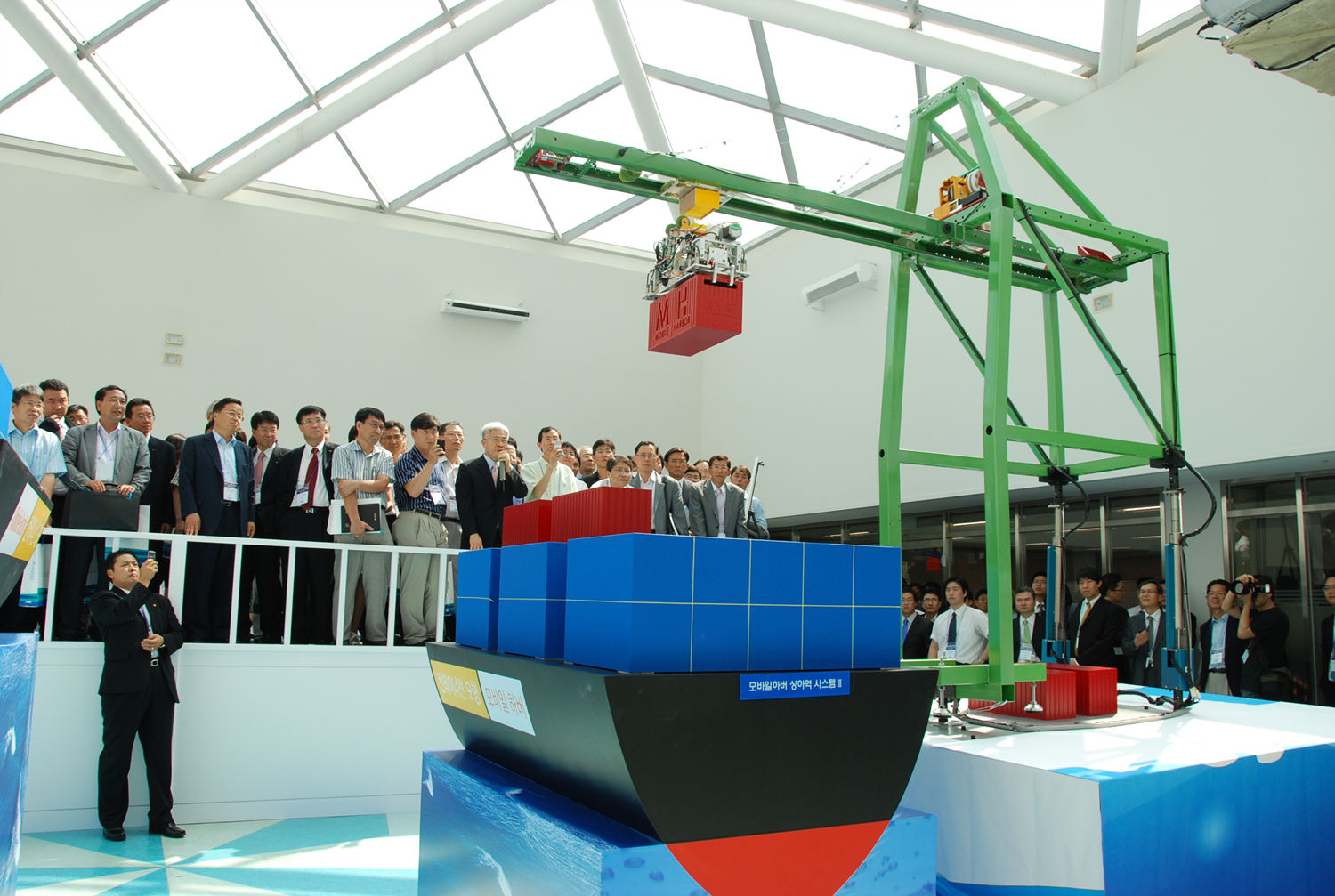 KAIST's Mobile Harbor Program Attracts Two Corporate Investments
KAIST-developed Mobile Harbor Program has attracted investments from Korea"s two big-name industrial corporations, university authorities said on Monday (Oct. 19).
KAIST has recently signed an agreement with Hyundai Wia Corp., a machine parts supplier, to collaborate in the researches of the mobile harbor programs and commercialization. Under the agreement, Hyundai WIA will invest a total of 7.5 billion won in the program for two years starting from January 2010.
KAIST has also received a letter of intent from the Daewoo Shipbuilding & Marine Engineering Co. on investing 20 billion won in the commercialization of the project.
The Mobile Harbor Program is designed to create mobile units that can go out to the ship which are anchored off-shore and unload the cargo and take it to where it is needed. It is aimed at overcoming the shortcomings of the current maritime container transportation systems. Container ships are getting larger and larger, requiring deep waters, large and complex loading and unloading systems, and major investments in facilities.
Prof. Byung-Man Kwak, leader of the program"s R&D team, said: "With the investment from two global industrial companies, the program has gained a crucial momentum. The development of the program is expected to help Korea to become a global leader in marine transportation and maintain its supremacy in shipbuilding."
2009.10.20 View 15944
KAIST's Mobile Harbor Program Attracts Two Corporate Investments
KAIST-developed Mobile Harbor Program has attracted investments from Korea"s two big-name industrial corporations, university authorities said on Monday (Oct. 19).
KAIST has recently signed an agreement with Hyundai Wia Corp., a machine parts supplier, to collaborate in the researches of the mobile harbor programs and commercialization. Under the agreement, Hyundai WIA will invest a total of 7.5 billion won in the program for two years starting from January 2010.
KAIST has also received a letter of intent from the Daewoo Shipbuilding & Marine Engineering Co. on investing 20 billion won in the commercialization of the project.
The Mobile Harbor Program is designed to create mobile units that can go out to the ship which are anchored off-shore and unload the cargo and take it to where it is needed. It is aimed at overcoming the shortcomings of the current maritime container transportation systems. Container ships are getting larger and larger, requiring deep waters, large and complex loading and unloading systems, and major investments in facilities.
Prof. Byung-Man Kwak, leader of the program"s R&D team, said: "With the investment from two global industrial companies, the program has gained a crucial momentum. The development of the program is expected to help Korea to become a global leader in marine transportation and maintain its supremacy in shipbuilding."
2009.10.20 View 15944